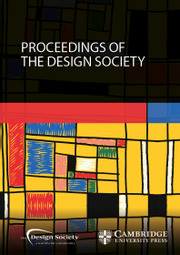No CrossRef data available.
Article contents
Using the low-tech concept to create scenarios: an analysis of its potential to design for sustainable urban future
Published online by Cambridge University Press: 16 May 2024
Abstract
Core share and HTML view are not available for this content. However, as you have access to this content, a full PDF is available via the ‘Save PDF’ action button.
Designers must be equipped with methods to contribute to sustainability transitions. Scenario planning arose as approach to integrate future uncertainties while the low-tech concept promotes technological discernment. This paper looks at how low-tech fuelled scenario planning. Analysing institutional and archetypical scenarios shows a partial integration through high and low-tech extremes. However, more nuanced considerations are lacking. This paper shows that low-tech can bring an interesting dimension to future scenarios and thus contributes to method development for sustainable design.
Information
- Type
- Design for Sustainability
- Information
- Creative Commons
- This is an Open Access article, distributed under the terms of the Creative Commons Attribution-NonCommercial-NoDerivatives licence (http://creativecommons.org/licenses/by-nc-nd/4.0/), which permits non-commercial re-use, distribution, and reproduction in any medium, provided the original work is unaltered and is properly cited. The written permission of Cambridge University Press must be obtained for commercial re-use or in order to create a derivative work.
- Copyright
- The Author(s), 2024.
References
Ademe (2021), Transition(s) 2050. Choisir maintenant. Agir pour le climat. Report. [online] https://librairie.ademe.fr/recherche-et-innovation/5072-prospective-transitions-2050-rapport.html (accessed 14/11/23).Google Scholar
Albert, M. (2019), "Sustainable frugal innovation - The connection between frugal innovation and sustainability", Journal of Cleaner Production, Vol. 237, https://doi.org/10.1016/j.jclepro.2019.117747CrossRefGoogle Scholar
Alexander, S. et Yacoumis, P. (2018), "Degrowth, energy descent, and ‘low-tech’ living: Potential pathways for increased resilience in times of crisis", Journal of Cleaner Production, Vol. 197/2. pp. 1840-1848. https://doi.org/10.1016/j.jclepro.2016.09.100Google Scholar
Bauwens, T., Hekkert, M., and Kirchherr, J. (2020), "Circular futures: What Will They Look Like?", Ecological Economics, Vol. 175/106703. https://doi.org/10.1016/j.ecolecon.2020.106703CrossRefGoogle Scholar
Bihouix, P., & McMahon, C. (2014), The Age of Low Tech: Towards a Technologically Sustainable Civilization (1st ed.). Bristol University Press. https://doi.org/10.2307/j.ctv177tgngGoogle Scholar
Bloquel, M. et al. (2022), État des lieux et perspectives des démarches « low-tech ». Report. [online] https://librairie.ADEME.fr/, (accessed 01/09/23).Google Scholar
Boschetti, F., Price, J., Walker, I. (2016), "Myths of the future and scenario archetypes", Technological Forecasting and Social Change, Vol. 11, pp 76-85, ISSN 0040-1625, https://doi.org/10.1016/j.techfore.2016.06.009CrossRefGoogle Scholar
Camilleri, R., Attard, M., Hickman, R. (2020), "Future Low-Carbon Transport Scenarios: Practice Theory-Based Visioning for Backcasting Studies", Sustainability, Vol. 14/74. https://doi.org/10.3390/su14010074Google Scholar
Chaudemanche, G. (2023), L'entreprise low-tech: Un cas de modèle d'affaires innovant, [Master's thesis], IAE Nancy.Google Scholar
Chen, D., et al, M.. (2021), "Framing, Context, and Methods". In Climate Change 2021: The Physical Science Basis. Contribution of Working Group I to the Sixth Assessment Report of the Intergovernmental Panel on Climate Change. In Masson-Delmotte, V. et al. (eds.). Cambridge University Press, Cambridge, United Kingdom and New York, NY, USA, pp. 147–286, https://doi.org/10.1017/9781009157896.003Google Scholar
CGEDD (2022), Prospective 2040-2060 des transports et des mobilités. 20 ans pour réussir collectivement les déplacements de demain. Report, February 2022.Google Scholar
Dator, J. (2017), "Manoa's four generic images of the future". APF compass. July 2017 issue.Google Scholar
De Smedt,P., Borch, K.,Fuller, T. (2013). "Future scenarios to inspire innovation", Technological Forecasting and Social Change, Vol. 80/3, pp 432-443, https://doi.org/10.1016/j.techfore.2012.10.006.Google Scholar
Fergnani, A. et Song, Z. (2020), "The six scenario archetypes framework: A systematic investigation of science fiction films set in the future", Futures, 124/102645. https://doi.org/10.1016/j.futures.2020.102645CrossRefGoogle Scholar
Gall, T., Vallet, F., Ben Ammar, M., Yannou, B. (2023), "Designing solutions for uncertain futures: A checklist for choosing suitable scenarios". Proceedings of the ICED23, 24th International Conference on Engineering Design, Bordeaux, France, July 24-28.Google Scholar
García, Garduño, et Gaziulusoy, C., İ. (2021), "Designing future experiences of the everyday: Pointers for methodical expansion of sustainability transitions research", Futures, 127, p. 102702. https://doi.org/10.1016/j.futures.2021.102702.Google Scholar
Girard, U. et Reyes, T. (2023), "Low Tech et Communs : quel positionnement et quels enjeux pour les futurs systèmes de production", Proceedings of 18th colloque S.mart, 4-6 avril, Carry-le-Rouet, France.Google Scholar
Grandjean, A. et al. (2021), Le rôle des infrastructures dans la transition bas-carbone et l'adaptation au changement climatique de la France, [online] https://www.carbone4.com/publication-infrastructures-france (accessed 03/03/23)Google Scholar
Hejazi, M. et al. (2013), "Scenarios of global municipal water-use demand projections over the 21st century", Hydrological Sciences Journal, Vol. 58/3, pp. 519-538. https://doi.org/10.1080/02626667.2013.772301CrossRefGoogle Scholar
Kostakis, V., Pazaitis, A. et Liarokapis, M. (2023), "Beyond high-tech versus low-tech: A tentative framework for sustainable urban data governance", Big Data & Society, Vol. 10/1. https://doi.org/10.1177/20539517231180583Google Scholar
Lee, J.-Y. et al. (2021), "Future Global Climate: Scenario-Based Projections and Near-Term Information". In: Climate Change 2021: The Physical Science Basis. Contribution of Working Group I to the Sixth Assessment Report of the Intergovernmental Panel on Climate Change. In: Masson-Delmotte, V. et al. (eds.) Cambridge University Press, Cambridge, Royaume-Uni et New York, NY, USA, pp. 553–672, https://doi.org/10.1017/9781009157896.006Google Scholar
Lopez, C. et al. (2021), La Ville Low-tech, [online] https://www.institutparisregion.fr/nos-travaux/publications/la-ville-low-tech (accessed 14/11/23).Google Scholar
Miskolczi, M., Foldes, D., Munkacsy, A., and Jaszberenyi, M. (2021), "Urban Mobility Scenarios until the 2030s", Sustainable Cities and Society, Vol. 72. https://doi.org/10.1016/j.scs.2021.103029/CrossRefGoogle Scholar
Sarlak, M., Ferretti, L.V., Biasi, R. (2021), "The Productive Landscape in the Desert Margin for the Sustainable Development of Rural Settlements: An Innovative Greenbelt for Maranjab Desert in Iran", Sustainability, 13/2077. https://doi.org/10.3390/su13042077Google Scholar
Schulte, J., Villamil, C., Hallstedt, S. (2020), "Strategic Sustainability Risk Management in Product Development Companies: Key Aspects and Conceptual Approach" Sustainability 12, no. 24: 10531. https://doi.org/10.3390/su122410531CrossRefGoogle Scholar
Selin, C., Kimbell, L., Ramirez, R. and Bhatti, Y., (2015). "Scenarios and design: Scoping the dialogue space". Futures, 74, pp.4-17. https://www.sciencedirect.com/science/article/abs/pii/S0016328715000804CrossRefGoogle Scholar
Spaniol, M. J. and Rowland, N. J. (2019), "Defining scenario", Futures Foresight Sciences, 1:e3, pp. 1-13. https://doi.org/10.1002/ffo2.3Google Scholar
Steffen, W. et al. (2015), "Planetary boundaries: Guiding human development on a changing planet", Science, 347/1259855. https://doi.org/10.1126/science.1259855CrossRefGoogle ScholarPubMed

